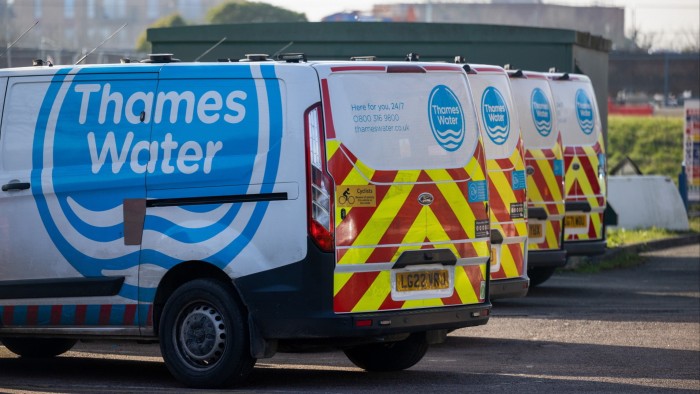Stay informed with free updates
Simply sign up to the Utilities myFT Digest — delivered directly to your inbox.
Thames Water may be forced to restate its accounts published last year, amplifying concerns over the financial stability of the UK’s largest water company.
Thames Water — which is attempting to avert renationalisation through a rescue bid from its creditors — is trying to understand the consequences of having to restate key figures in its accounts for the year ending March 2024, according to documents seen by the Financial Times.
A restatement could cause further breaches of Thames Water’s debt covenants, strict terms that mean the utility has to abide by certain financial ratios. The accounting watchdog, the Financial Reporting Council, is aware of the issue, according to people familiar with the situation.
The UK’s largest water utility is struggling under a near-£20bn debt mountain and has agreed a backup £5bn rescue plan with its creditors after US private equity firm KKR walked away from a bid earlier this month.
The senior creditor group, which comprises around 100 financial institutions including US hedge funds Elliott Management and Silver Point, has been unaware of the accounting problem, according to two people familiar with the situation.
There was concern in the Thames Water camp that any amendment to the accounts could prompt one of its senior lenders to allege that breach of debt terms had occurred, according to the documents.
In that instance, Thames Water could argue that it acted in good faith and obtained sign-off of its accounts from PwC, the documents also read.
The accounts for the year to March 2024 showed Thames Water made its first profit in four years at £139mn, compared with a loss of £132mn in the prior year. However, that was almost entirely down to the previously agreed 10 per cent increase in household bills in 2023, which raised revenues by £221mn to £2.4bn.
Lawyers at Linklaters, the “magic circle” firm representing Thames Water, have suggested there would be “no practical consequences” to Thames Water breaching covenants as a result of the restatements, however, as the utility already triggered key covenants last year, the documents read.
The potential restatements come at a perilous moment for Thames Water. The UK government said on Thursday that it has “stepped up” preparations to plunge Thames Water into its special administration regime, or SAR, and it signalled it would reject demands from the creditors to exempt it from key environmental laws; a condition of their rescue bid.
The creditors — who have already agreed a separate emergency £3bn loan with Thames Water to stave off administration — had demanded that the government and regulator Ofwat grant licence changes and even emergency legislation to shield the business from environmental-protection laws.
The stand-off between the creditors and the government threatens to make Thames Water the first water company to fall into the SAR since utilities in England and Wales were privatised in 1989.
Thames Water’s prior year accounts were prepared under its chief finance director Alastair Cochran, who resigned in March and has since been replaced. He did not immediately respond to a request for comment made via LinkedIn.
Thames Water declined to specify what the error had been to prompt potential restatement. It said in a statement: “We follow all UK-adopted International Accounting Standards and take our regulatory accounting responsibilities seriously.
“The company remains focused on putting Thames Water on a more stable financial foundation, implementing its turnaround plan and delivering a market led solution that is in the best interests of customers, UK taxpayers and the wider economy.”
The senior creditor group, Ofwat, the government, the FRC, Linklaters, and PwC all declined to comment.



